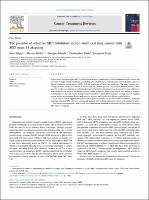| dc.contributor | Vall d'Hebron Barcelona Hospital Campus |
| dc.contributor.author | Salgia, Ravi |
| dc.contributor.author | Sattler, Martin |
| dc.contributor.author | Scheele, Juergen |
| dc.contributor.author | Stroh, Christopher |
| dc.contributor.author | Felip Font, Enriqueta |
| dc.date.accessioned | 2021-10-22T09:11:15Z |
| dc.date.available | 2021-10-22T09:11:15Z |
| dc.date.issued | 2020-07-01 |
| dc.identifier.citation | Salgia R, Sattler M, Scheele J, Stroh C, Felip E. The promise of selective MET inhibitors in non-small cell lung cancer with MET exon 14 skipping. Cancer Treat Rev. 2020 Jul 1;87:102022. |
| dc.identifier.issn | 0305-7372 |
| dc.identifier.uri | https://hdl.handle.net/11351/6448 |
| dc.description | MET inhibitor; NSCLC |
| dc.description.abstract | Dysregulated activation of the MET tyrosine kinase receptor is implicated in the development of solid tumors and can arise through several mechanisms, including gene amplification, overexpression of the receptor and/or its ligand hepatocyte growth factor (HGF), and the acquisition of activating mutations. The most common activating mutations cause exon 14 to be skipped during MET mRNA splicing. This in-frame deletion, known as MET exon 14, results in production of a shortened receptor that lacks a juxtamembrane domain but retains affinity for HGF. However, the negative regulatory function located within this protein sequence is lost, leading to receptor accumulation on the cell surface and prolonged activation by HGF. MET mutations causing exon 14 skipping appear to be true oncogenic drivers and occur in patients and tumors with distinct characteristics.
Increasing evidence suggests that tumors carrying such mutations are sensitive to MET inhibition, raising the hope that selective MET inhibitors will provide patients with optimal anticancer activity with minimal toxicity.
We discuss the prospects for selective MET inhibitors in the treatment of non-small cell lung cancer harboring MET exon 14 skipping. |
| dc.language.iso | eng |
| dc.publisher | Elsevier |
| dc.relation.ispartofseries | Cancer Treatment Reviews;87 |
| dc.rights | Attribution-NonCommercial-NoDerivatives 4.0 International |
| dc.rights.uri | http://creativecommons.org/licenses/by-nc-nd/4.0/ |
| dc.source | Scientia |
| dc.subject | Pulmons - Càncer - Tractament |
| dc.subject | Proteïnes quinases - Inhibidors - Ús terapèutic |
| dc.subject.mesh | Carcinoma, Non-Small-Cell Lung |
| dc.subject.mesh | Protein Kinase Inhibitors |
| dc.subject.mesh | /therapeutic use |
| dc.title | The promise of selective MET inhibitors in non-small cell lung cancer with MET exon 14 skipping |
| dc.type | info:eu-repo/semantics/article |
| dc.identifier.doi | 10.1016/j.ctrv.2020.102022 |
| dc.subject.decs | carcinoma de pulmón de células no pequeñas |
| dc.subject.decs | inhibidores de proteínas cinasas |
| dc.subject.decs | /uso terapéutico |
| dc.relation.publishversion | https://doi.org/10.1016/j.ctrv.2020.102022 |
| dc.type.version | info:eu-repo/semantics/publishedVersion |
| dc.audience | Professionals |
| dc.contributor.organismes | Institut Català de la Salut |
| dc.contributor.authoraffiliation | [Salgia R] Department of Medical Oncology and Therapeutics Research, City of Hope National Medical Center, Duarte, CA, USA. [Sattler M] Department of Medical Oncology, Dana–Farber Cancer Institute, Boston, MA, USA. Department of Medicine, Harvard Medical School, Boston, MA, USA d Merck KGaA, Darmstadt, Germany. [Scheele J, Stroh C] Merck KGaA, Darmstadt, Germany. [Felip E] Servei d’Oncologia Mèdica, Vall d’Hebron Hospital Universitari, Barcelona, Spain |
| dc.identifier.pmid | 32334240 |
| dc.identifier.wos | 000540249800001 |
| dc.rights.accessrights | info:eu-repo/semantics/openAccess |

